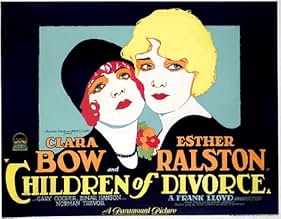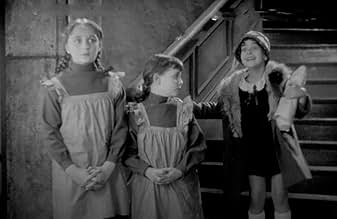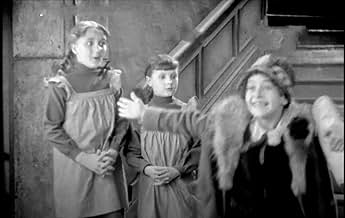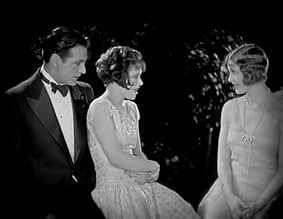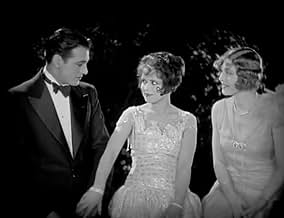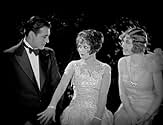A young flapper tricks her childhood sweetheart into marrying her. He really loves another woman, but didn't marry her for fear the marriage would end in divorce, like his parents'. Complica... Read allA young flapper tricks her childhood sweetheart into marrying her. He really loves another woman, but didn't marry her for fear the marriage would end in divorce, like his parents'. Complications ensue.A young flapper tricks her childhood sweetheart into marrying her. He really loves another woman, but didn't marry her for fear the marriage would end in divorce, like his parents'. Complications ensue.
Catherine Cotter
- Boarding School Student
- (uncredited)
Bill Elliott
- Party Guest
- (uncredited)
Featured reviews
"Children of Divorce" (1927) is a melodramatic love triangle directed by Frank Lloyd, and starring Clara Bow, Esther Ralston and Gary Cooper. In 1927, the Cooper stock was on the rise. Gary had met Clara Bow in a party just after she had finished her signature film "It" (1927). They quickly became "special friends", and Bow insisted that Coop must be inserted into her new film, even though it was finished and all but one of the sets had been destroyed. But the studio was forced to agree with their star, and Josef von Sternberg filmed a quick scene with Cooper as a reporter, and it was added to the film. This is all told very well in Larry Swindell's book "The Last Hero: A Biography of Gary Cooper" (1981).
By their next onscreen encounter, Cooper was elevated to be the male lead, albeit in a very female centric melodrama. "Children of Divorce" is a morality tale that asks, whether children of divorced couples are more likely to become divorcees themselves. Thus, its attempt is to glorify the sacred nature of marriage by casting shame on divorced couples. It's not a subtle film. Like many a silent film, it begins with the characters as children. All three, Jean (Ralston), Kitty (Bow) and Ted (Cooper) were raised in a children's home run by nuns, because their rich, divorced parents couldn't bother to take care of the kids themselves. As they grow up, Jean and Ted are in love and want to marry, but Kitty also has an eye for Ted.
The contrast between Jean and Kitty is shown to be night and day. Jean is respectful, "wife material" so to say, while Kitty is a carefree flapper who likes to have fun. During a night when he gets drunk, Kitty tricks Ted into marrying him, and when it's announced that they are going to have a child, Jean won't allow Ted to divorce Kitty, because then world would have one more child of divorce. If you can't guess the outcome, you probably haven't watched too many silent melodramas.
I have mixed feelings about this film. The core merit it has going on, is the presence of Bow and Cooper, who are both very charismatic. The film is worth watching solely because of them. I dislike films that give such a black and white separation of good girls and bad girls. From my perspective, probably from today's perspective, Ralston appears boring and lifeless, while Clara Bow's charm has not been damaged by the years. I for one would love to wake up and discover myself married to a girl like Kitty. The film is heavy-handed with its marital themes, and it feels like it tries to brainwash the female audience into obedient housewives and dutiful mothers. Clara Bow is another alternative for a female role model, and therefore must be destroyed. "It" presented Bow's sex appeal in a lively way, and allowed it to exist. This film looks down on her, even if she is the star.
I also have never liked the American notion of "childhood sweethearts must marry as adults" in films. This is nonsense. It is very unlikely, that the first person of the opposite sex that you meet, is going to be the most suitable marital candidate you will ever meet. Therefore films like this, that tell the audience how Ted and Jean must be re-united, because they loved each other a long time ago, don't really hit home for me. There is even a creepy scene, where Ted stares at Jean, who is comforting his child, and imagines Jean as a little girl. It played the wrong way in this context, sorry.
So all in all, as a narrative, this doesn't hold up even a bit. But it does show how Cooper can act and led to better parts for him. Clara Bow may be the bad woman here, but she is easily the most memorable thing in the film.
By their next onscreen encounter, Cooper was elevated to be the male lead, albeit in a very female centric melodrama. "Children of Divorce" is a morality tale that asks, whether children of divorced couples are more likely to become divorcees themselves. Thus, its attempt is to glorify the sacred nature of marriage by casting shame on divorced couples. It's not a subtle film. Like many a silent film, it begins with the characters as children. All three, Jean (Ralston), Kitty (Bow) and Ted (Cooper) were raised in a children's home run by nuns, because their rich, divorced parents couldn't bother to take care of the kids themselves. As they grow up, Jean and Ted are in love and want to marry, but Kitty also has an eye for Ted.
The contrast between Jean and Kitty is shown to be night and day. Jean is respectful, "wife material" so to say, while Kitty is a carefree flapper who likes to have fun. During a night when he gets drunk, Kitty tricks Ted into marrying him, and when it's announced that they are going to have a child, Jean won't allow Ted to divorce Kitty, because then world would have one more child of divorce. If you can't guess the outcome, you probably haven't watched too many silent melodramas.
I have mixed feelings about this film. The core merit it has going on, is the presence of Bow and Cooper, who are both very charismatic. The film is worth watching solely because of them. I dislike films that give such a black and white separation of good girls and bad girls. From my perspective, probably from today's perspective, Ralston appears boring and lifeless, while Clara Bow's charm has not been damaged by the years. I for one would love to wake up and discover myself married to a girl like Kitty. The film is heavy-handed with its marital themes, and it feels like it tries to brainwash the female audience into obedient housewives and dutiful mothers. Clara Bow is another alternative for a female role model, and therefore must be destroyed. "It" presented Bow's sex appeal in a lively way, and allowed it to exist. This film looks down on her, even if she is the star.
I also have never liked the American notion of "childhood sweethearts must marry as adults" in films. This is nonsense. It is very unlikely, that the first person of the opposite sex that you meet, is going to be the most suitable marital candidate you will ever meet. Therefore films like this, that tell the audience how Ted and Jean must be re-united, because they loved each other a long time ago, don't really hit home for me. There is even a creepy scene, where Ted stares at Jean, who is comforting his child, and imagines Jean as a little girl. It played the wrong way in this context, sorry.
So all in all, as a narrative, this doesn't hold up even a bit. But it does show how Cooper can act and led to better parts for him. Clara Bow may be the bad woman here, but she is easily the most memorable thing in the film.
Seems as though everyone's in love with everyone else in this soaper from what ultimately became Paramount Studios. There are good performances from all concerned, even from Gary Cooper in his first starring role. It is summarized by the reviewer from the Library of Congress above, and is a jumble of love shuffled among the various characters. The nominal star is Clara Bow, who here plays the 'heavy', but all eyes are on Gary Cooper, who subsequently became a huge Hollywood star. Esther Ralston has the supporting actress role and she is beautiful in a sympathetic part.
The film is what amounts to a polemic on the hazards of divorce but is not without merit. There are several poignant, sentimental moments which hold up due to some very competent performances, even by Cooper himself in his first big part. The year is 1927 and the film holds some very outdated views of marriage and divorce but, as often with silents, they must be viewed with a sense of atavism, as when one goes to a museum - or, in this case, a film festival. (Capitolfest, Rome, N.Y., 8/12/16.
The film is what amounts to a polemic on the hazards of divorce but is not without merit. There are several poignant, sentimental moments which hold up due to some very competent performances, even by Cooper himself in his first big part. The year is 1927 and the film holds some very outdated views of marriage and divorce but, as often with silents, they must be viewed with a sense of atavism, as when one goes to a museum - or, in this case, a film festival. (Capitolfest, Rome, N.Y., 8/12/16.
Children of Divorce (1927)
** 1/2 (out of 4)
As the film starts off we're told about special homes where children of divorced parents can go and stay. We then meet Kitty who is dropped off by her mother and can't make friends but soon Jean becomes an older sister to her. Jean meets Edward and the two make a childish joke that one day they will marry. Flash-forward and Kitty (Clara Bow) is a flapper and soon a drunken night leads to her marrying Edward (Gary Cooper), which of course breaks the heart of Jean (Esther Ralston).
CHILDREN OF DIVORCE is the greatest movie that its stars ever made. In fact, I honestly thought there were quite a few problems throughout the picture and it wasn't nearly as good as I was hoping for when I went into it. With that said, both Bow and Cooper are legends of the screen and them alone makes this worth sitting through.
The story itself is pretty melo-dramatic and downright predictable at times. For starters, the story never really makes any sense because as children the Bow character is pretty much a shy and timid girl. Then, when we see the adult version, there she is as this loud, over-the- top party girl. There's just nothing here that's very believable as the first portion just seems over-dramatic and the second portion is just your typical Bow character from this period.
I'm certainly not going to ruin what happens as the movie goes along but there's no question that it's rather unbelievable and I'd argue that the ending is laughably bad and predictable. It's certainly a morality tale but to me it was just a bit overdone for its own good. Director Frank Lloyd (with apparent re-shoots by Josef von Sternberg) does a decent job at keeping the film moving but visually there's not too much here.
I thought Bow was good in the film, delivering the type of performance that you'd expect from her. This certainly wasn't her best role but there's no question that it's hard to take your eyes off of her. Cooper was also good in the part, although it's clear he was still learning his way on the screen. I didn't care too much for Ralston's performance as she was certainly the weak link.
It seems I'm really coming down hard on CHILDREN OF DIVORCE but perhaps it's mainly due to how disappointed I was in it. It's a decent movie and certainly worth watching if you're a fan of the stars but there's no question that they did much better work.
** 1/2 (out of 4)
As the film starts off we're told about special homes where children of divorced parents can go and stay. We then meet Kitty who is dropped off by her mother and can't make friends but soon Jean becomes an older sister to her. Jean meets Edward and the two make a childish joke that one day they will marry. Flash-forward and Kitty (Clara Bow) is a flapper and soon a drunken night leads to her marrying Edward (Gary Cooper), which of course breaks the heart of Jean (Esther Ralston).
CHILDREN OF DIVORCE is the greatest movie that its stars ever made. In fact, I honestly thought there were quite a few problems throughout the picture and it wasn't nearly as good as I was hoping for when I went into it. With that said, both Bow and Cooper are legends of the screen and them alone makes this worth sitting through.
The story itself is pretty melo-dramatic and downright predictable at times. For starters, the story never really makes any sense because as children the Bow character is pretty much a shy and timid girl. Then, when we see the adult version, there she is as this loud, over-the- top party girl. There's just nothing here that's very believable as the first portion just seems over-dramatic and the second portion is just your typical Bow character from this period.
I'm certainly not going to ruin what happens as the movie goes along but there's no question that it's rather unbelievable and I'd argue that the ending is laughably bad and predictable. It's certainly a morality tale but to me it was just a bit overdone for its own good. Director Frank Lloyd (with apparent re-shoots by Josef von Sternberg) does a decent job at keeping the film moving but visually there's not too much here.
I thought Bow was good in the film, delivering the type of performance that you'd expect from her. This certainly wasn't her best role but there's no question that it's hard to take your eyes off of her. Cooper was also good in the part, although it's clear he was still learning his way on the screen. I didn't care too much for Ralston's performance as she was certainly the weak link.
It seems I'm really coming down hard on CHILDREN OF DIVORCE but perhaps it's mainly due to how disappointed I was in it. It's a decent movie and certainly worth watching if you're a fan of the stars but there's no question that they did much better work.
'Children of Divorce' is about a love quadrangle: childhood friends Kitty (Clara Bow) and Jean (Esther Ralston) on the one side, Vico (Einar Hanson) and Ted (Gary Cooper) on the other. Kitty and Vico love each other, as do Jean and Ted, but what looks straightforward is a receipe for tragedy. This is because Kitty has been taught by her mother that a woman needs to marry wealth - at least when she marries for the first time - and unfortunately Vico is not wealthy. He is the scion of impoverished (that's a relative term) European nobility and expected to do his duty by his family and marry wealth himself. Ted is wealthy and is altogether a bit of a playboy. Tragedy strikes when Jean puts off marrying him until he has got a proper job. Kitty uses the time in order to organise a raucous party, and on the morning after Ted wakes up to discover that, in a drunken stupor, he has married her rather than his true love Jean.
The highlights of the picture are Clara Bow and Gary Cooper. Cooper playes his role evenhandedly. He is remarkable rather because of his later stardom than because his acting here is particularly outstanding. Bow, by contrast, is outstanding. She starts out as a careless flapper and ends as a desparately unhappy woman who sees suicide as her only way out, and every detail and moment of this transition is absolutely convincing. The plot is obviously pretty convoluted and heavy on morals. It does lay it on rather thick, I must say. The viewers are clearly expected to take away the message that divorce was to be avoided at all costs (Kitty's, Jean's and Ted's parents are all divorced, and it is Kitty's divorced mother whose idea of marriage is at the bottom of all the trouble). I am generally no fan of films that try to educate the audience in such a way, but in this case Clara Bow's performance makes up for the deficiencies, at least to a very large extent. All in all, the upsides of 'Children of Divorce' (meaning her and Cooper) outweigh the downsides by quite a bit. In sum: good film.
The highlights of the picture are Clara Bow and Gary Cooper. Cooper playes his role evenhandedly. He is remarkable rather because of his later stardom than because his acting here is particularly outstanding. Bow, by contrast, is outstanding. She starts out as a careless flapper and ends as a desparately unhappy woman who sees suicide as her only way out, and every detail and moment of this transition is absolutely convincing. The plot is obviously pretty convoluted and heavy on morals. It does lay it on rather thick, I must say. The viewers are clearly expected to take away the message that divorce was to be avoided at all costs (Kitty's, Jean's and Ted's parents are all divorced, and it is Kitty's divorced mother whose idea of marriage is at the bottom of all the trouble). I am generally no fan of films that try to educate the audience in such a way, but in this case Clara Bow's performance makes up for the deficiencies, at least to a very large extent. All in all, the upsides of 'Children of Divorce' (meaning her and Cooper) outweigh the downsides by quite a bit. In sum: good film.
The Frank Lloyd directed film, April 1927's "Children of Divorce," opens at a Catholic divorce colony where recently-single parents who can't afford to raise kids by themselves drop off their children on a temporary basis. The children actors playing the three leads form a close bond, with Ted (Cooper) promising to marry Jean (Ralston) when they grow up while Kitty (Bow) looks on. But as adults, flapper Jean gets Ted drunk at a party and marries him, much to the consternation of intended lover Jean.
Ralston claims being on the set with the 22-year-old Clara was both enjoyable and scandalous. She recalls Bow describing in detail where and how she and her actor boyfriend Cooper made love, causing cast members to experience a red glow on their faces listening to such escapades. Bow also saved Cooper's budding career by intervening on his behalf when Lloyd threatened to release the young actor for constantly not remembering his movements in a early scene. Cooper's visibility in "Children of Divorce" catapulted his screen presence, launching him towards Hollywood stardom.
As for Clara, "Children of Divorce" provided her with one of the most dramatic scenes in her growing portfolio. Near the film's ending, Bow's character swallows poison because she realizes she can't marry a prince. She lays in bed comforted by her childhood friend Jean, who forgives her for her past indiscretions. The dramatic sequence's atmosphere required more than director Lloyd provided. So Paramount brought in young director, Josef von Sternberg, who was gaining a reputation for his expert lighting, to reshoot Kitty's final moments. His genius was to provide the shadow of a curtain sweeping over her as the nun lowers the wondow drape, emphasizing the end of Kitty's tempestuous life.
Ralston claims being on the set with the 22-year-old Clara was both enjoyable and scandalous. She recalls Bow describing in detail where and how she and her actor boyfriend Cooper made love, causing cast members to experience a red glow on their faces listening to such escapades. Bow also saved Cooper's budding career by intervening on his behalf when Lloyd threatened to release the young actor for constantly not remembering his movements in a early scene. Cooper's visibility in "Children of Divorce" catapulted his screen presence, launching him towards Hollywood stardom.
As for Clara, "Children of Divorce" provided her with one of the most dramatic scenes in her growing portfolio. Near the film's ending, Bow's character swallows poison because she realizes she can't marry a prince. She lays in bed comforted by her childhood friend Jean, who forgives her for her past indiscretions. The dramatic sequence's atmosphere required more than director Lloyd provided. So Paramount brought in young director, Josef von Sternberg, who was gaining a reputation for his expert lighting, to reshoot Kitty's final moments. His genius was to provide the shadow of a curtain sweeping over her as the nun lowers the wondow drape, emphasizing the end of Kitty's tempestuous life.
Did you know
- TriviaJosef von Sternberg was called in by Paramount to reshoot some scenes, shoot new scenes and recut the existing footage after executives made the determination that the film was not releasable.
- Quotes
Kitty Flanders: You'd make a marvelous second husband but you are too much of a luxury for a poor girl's first husband.
- ConnectionsFeatured in Hollywood (1980)
- How long is Children of Divorce?Powered by Alexa
Details
- Runtime
- 1h 10m(70 min)
- Sound mix
- Aspect ratio
- 1.33 : 1
Contribute to this page
Suggest an edit or add missing content


